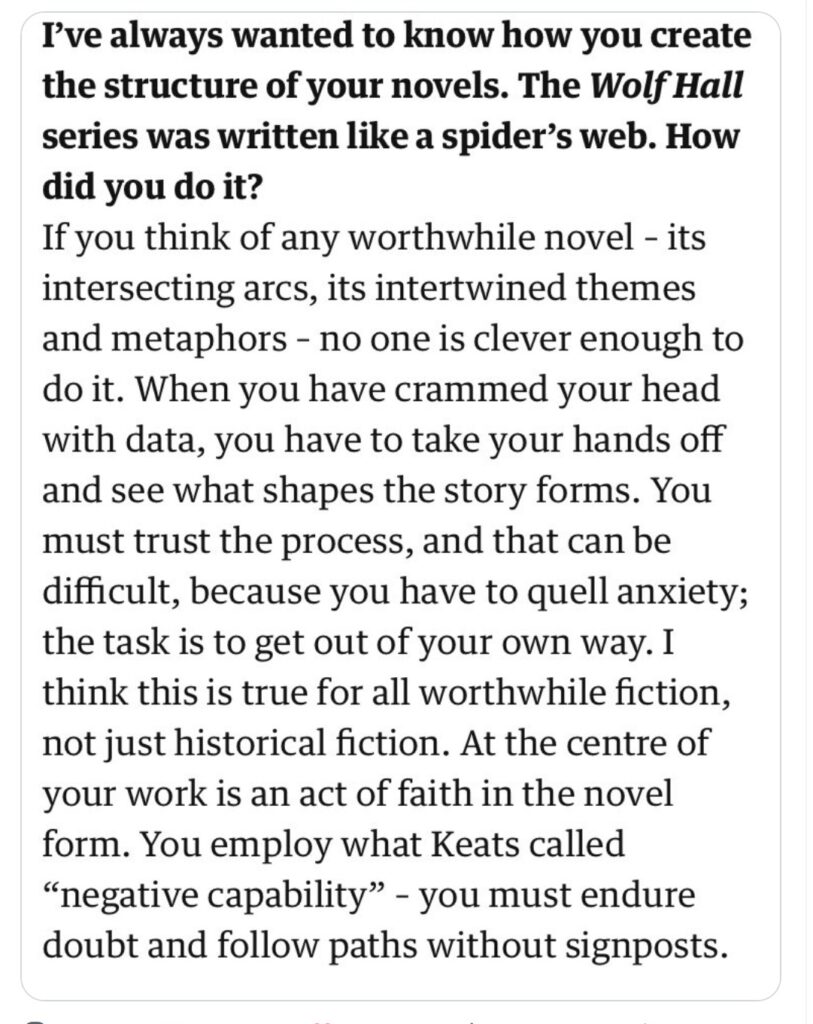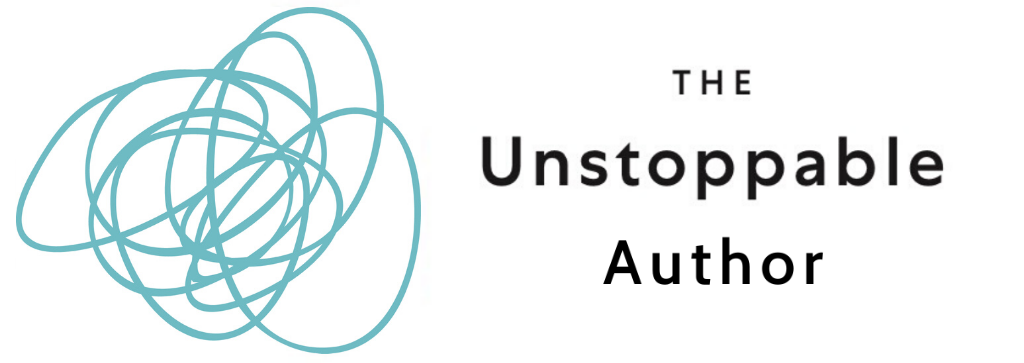
I saw the above interview quote on Twitter last week, taken from a Guardian article featuring the late Hilary Mantel.
It seemed to resonate with a lot of authors. Sometimes, this is exactly the kind of thing you need to hear. For those of us who have ‘pantsing’ in our process to even a small degree, this is cheering stuff. If this is how the mighty Mantel thought of it, with all of her brilliance and her exquisite historical research and detail, then we should surely try to do the same.
I’ve been thinking a lot these past few weeks about trusting the process of writing a first draft, which, for me anyway, means ignoring what I see on social media, ignoring what ideas I might have about the current market, and ignoring my own inner critic, which is always so keen to have things neatly polished and saleable before they’re even been written.
I try to plan my first drafts but it rarely works. Don’t get me wrong, as I tell my MS Report clients over and over again, a narrative does need a structure. It’s not just going to pour out of you perfectly formed. There are tools and techniques to storytelling, reasons stories work and reasons they fail to grip, and once you understand how and why story works, you can apply those lessons and make your material shine. And there’s no doubt that having a clear identity for your novel is pretty much required if you want to be trad published.
But, even knowing all this, I still can’t start with a fixed plan. God, I wish I could! Knowing what I am going to write would save so much time. Because I know about story structure, some sort of natural story form will probably emerge as I write. If not, I’ll corral it all into shape in the redraft. But first of all, I have to do an unplanned draft to find out who and what I am writing about. For me, at its best, writing a draft feels like tracking an animal through a forest. I can’t decide the journey ahead of time, because what I’m following is alive and has its own will. If I plan the journey and then follow it, I’m just walking alone.
Writer Lena Dunham said something similar in this quote below, which also touches on how too much input from the world can prevent a writer from tuning in to their muse, in an interview with the Guardian back in Sep 2022:
“Though my voice is loud, I’m actually a person who feels most comfortable alone in the world of thoughts and books. I had an instinct that taking some time away was going to be necessary to survive – there was a little while there when I wasn’t hearing my own voice.” To write, she says, you need to feel “like you’re a hound that’s smelled a fox and you just have to chase it all the way into its hole. My senses had been blunted by the experience of being in the world in that way.” By which she means: constantly scrutinised.
Mind you, as Mantal intimates, it’s not always easy to trust. To allow the book to be what it wants to be. To get out of our own way, to believe that our subconscious has a grander and more brilliant plan for our book than our wonderful but also slightly tense, control freak brains can summon up.
I DO believe this. My creativity has always led me where I needed to go (notice I don’t say wanted!) I just struggle to remember that sometimes, as we all do. I find, mostly, that the times I struggle to trust the muse are the same times I have my eye set on something in the future – a way the book should be, how I want to appear to others, the sort of success I think I should have and the best way I can see to getting it. I know you can’t really compare books to children but there is a similarity there, I think, to those parents who insist on moulding their kids for their own ego (no doubt messing those kids up in the process) and the other ones who are secure enough to let their kids be what they want to be – even if that means they’re maybe a bit weird and unpopular for a while. Those parents can do that because they are sufficient mentally healthy enough to know that their children are not THEM. I think sometimes we forget that we are not our books.
Anyway, the point is, letting go of the outcome is useful, primarily because when you let go and follow the story, that tends to be where you chance upon the muse. My muse likes to hang out in the shower, and when i least expect it, it will leap out and tell me something I didn’t know about my work in progress – “HEY, THE X is actually Y!” I’ll stand there, lathering my hair, agog, marvelling at this fact, as though someone’s just filled me in on the latest twist in my favourite TV show. “No way!” I’ll say. “That makes loads of sense and I never saw that coming”. This is what i love the most about writing and this is reason number one to trust the process – because it will surprise and delight you like nothing else can. It will also worry you and frustrate you and you will spend a good portion of the time wailing inwardly (or, you know, outwardly) “but where is this going? Does that even make sense? I mean, what the hell?”
But I say, let us just trust. And then we can tidy it all up later.
Other places the muse likes to hang out. Long walks alone. That few minutes just before you properly go to sleep, when it’ll bellow in your ear – “HE should DIE!” And you’ll leap up, wide eyes and hair akimbo, to get a pen.
So, this is just to say, loosen up a bit. Trust the process a bit, even if you love planning and planning really works for you (Jealous, moi?) let your subconscious get involved. Find out where the muse hangs out. And let the unknown aspects of your story reveal themselves to you.
Nicola x
PS. Where does your muse hang out? When were you last hit with an unexpected but wonderful idea? Leave a comment and let me know!
Where the muse hangs out

